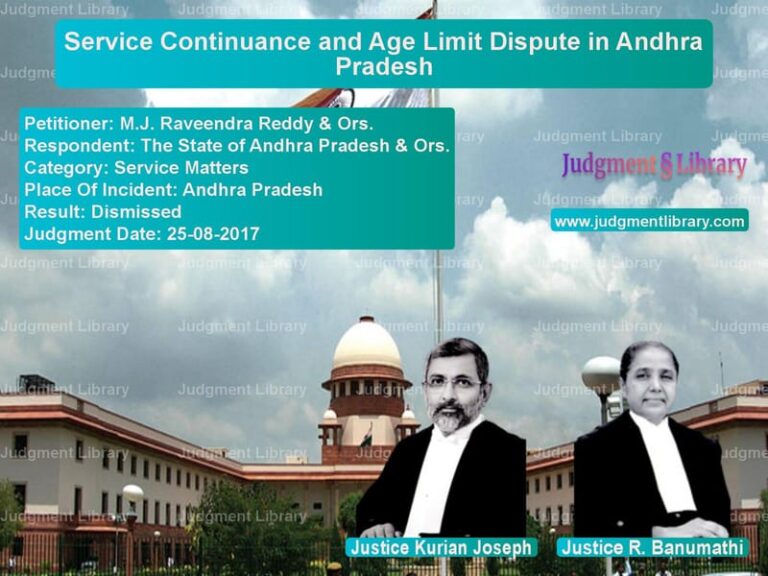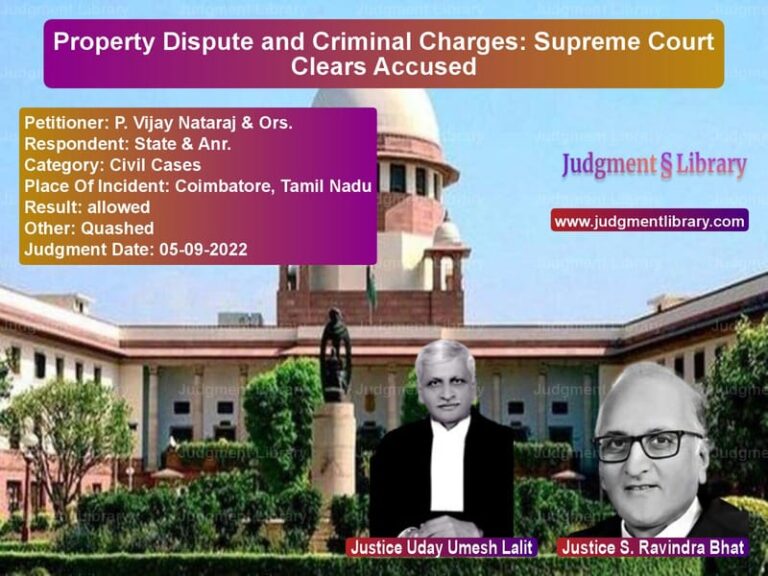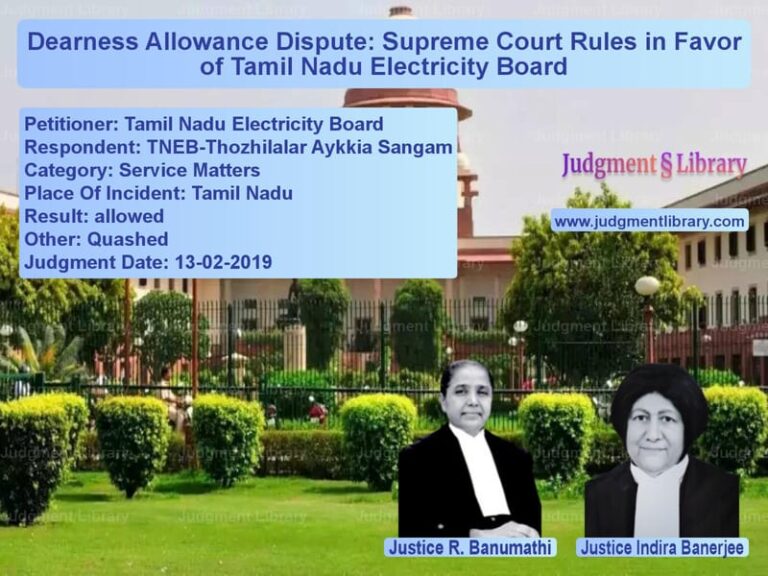Supreme Court Acquits Two Trade Union Leaders in Assam Murder Case
The Supreme Court of India recently delivered a significant judgment in the case of Chaitu Gowala & Another vs. The State of Assam, acquitting two trade union leaders who were earlier convicted for murder under Sections 302, 392, 148, 323, and 149 of the Indian Penal Code (IPC). The Court ruled that there was no direct evidence linking them to the crime and that their conviction was based on assumptions rather than concrete proof.
Background of the Case
The case arose from the murder of Rupak Kumar Gogoi, the Managing Director of a company in Assam, in which the accused and several others were working as laborers. At the time of the incident, Chaitu Gowala and Ajay Ahari were the President and Secretary of the labor union at the company.
A total of 70 accused persons were initially charged in the case. After trial, 57 were acquitted, while 13, including the appellants, were convicted and sentenced to life imprisonment by the trial court. The conviction was later upheld by the Gauhati High Court, leading to the present appeal before the Supreme Court.
Read also: https://judgmentlibrary.com/supreme-court-modifies-sentence-in-maharashtra-assault-case/
Legal Proceedings
Arguments by the Appellants
- The appellants contended that there was no evidence directly linking them to the murder of Rupak Kumar Gogoi.
- They argued that they were only present at the scene as office bearers of the trade union and had no role in inciting violence.
- The defense maintained that the appellants had actually tried to control the situation when the laborers gathered and attacked the deceased.
- It was further argued that no evidence was presented to show that they instigated the mob or participated in the violence.
Arguments by the State of Assam
- The prosecution relied on the testimony of three eyewitnesses—PW3, PW4, and PW6—who claimed that the accused were present at the scene and spoke to the laborers in their local language.
- It was argued that while there was no direct evidence of the appellants assaulting the deceased, their presence and speech had triggered the violent attack.
- The State contended that the appellants were rightly convicted with the aid of Section 149 IPC, which allows for conviction of all members of an unlawful assembly if a common object is established.
Supreme Court’s Observations
The Supreme Court, led by Justice M.R. Shah and Justice Krishna Murari, carefully examined the depositions and legal aspects before making the following key observations:
1. No Direct Evidence Against the Appellants
The Court scrutinized the depositions of the eyewitnesses (PW3, PW4, and PW6) and found that there was no direct evidence to prove that the appellants had physically assaulted the deceased.
2. Mere Presence Does Not Establish Guilt
The Court emphasized that being present at the scene of a crime is not enough to establish guilt unless there is clear evidence of participation. It observed:
“Mere presence of the accused at the place of incident does not ipso facto establish their involvement in the crime.”
3. No Evidence of Instigation
The prosecution had argued that the appellants had spoken to the laborers before the violence broke out. However, the Court found that there was no evidence regarding what exactly was said by the appellants:
“There is no record of what the accused spoke in their own language and whether it was an instigation to commit the crime.”
4. Section 149 IPC Not Applicable
The Court ruled that the appellants could not be convicted under Section 149 IPC (unlawful assembly) unless it was proven that they shared the common intention of committing murder. It noted:
“In the absence of evidence showing active participation or instigation, the conviction under Section 149 IPC is unsustainable.”
Final Verdict
The Supreme Court ruled as follows:
- The conviction of Chaitu Gowala and Ajay Ahari under Sections 302, 392, 148, 323, and 149 IPC was quashed and set aside.
- The appellants were acquitted of all charges.
- The trial court’s and High Court’s conviction of the other accused in the case remained intact.
- The appellants were ordered to be released immediately if not required in any other case.
Impact of the Judgment
This ruling has significant implications for criminal law and trade union activities:
- It reinforces that convictions must be based on clear evidence rather than mere presence at a crime scene.
- It ensures that trade union leaders are not held liable for acts of violence unless their direct involvement is proven.
- It sets an important precedent on the interpretation of Section 149 IPC, ensuring that its application is limited to cases where common intent is established.
Conclusion
The Supreme Court’s decision in Chaitu Gowala & Another vs. The State of Assam upholds the principles of criminal justice by ensuring that convictions are based on clear and direct evidence. The ruling is a crucial precedent for cases involving mob violence and trade union protests, reinforcing the need for thorough judicial scrutiny before attributing criminal liability.
Read also: https://judgmentlibrary.com/supreme-court-dismisses-review-petition-in-madhya-pradesh-murder-case/
Petitioner Name: Chaitu Gowala and Ajay Ahari.Respondent Name: The State of Assam.Judgment By: Justice M.R. Shah, Justice Krishna Murari.Place Of Incident: Assam.Judgment Date: 07-09-2022.
Don’t miss out on the full details! Download the complete judgment in PDF format below and gain valuable insights instantly!
Download Judgment: chaitu-gowala-and-aj-vs-the-state-of-assam-supreme-court-of-india-judgment-dated-07-09-2022.pdf
Directly Download Judgment: Directly download this Judgment
See all petitions in Murder Cases
See all petitions in Bail and Anticipatory Bail
See all petitions in Custodial Deaths and Police Misconduct
See all petitions in Judgment by Mukeshkumar Rasikbhai Shah
See all petitions in Judgment by Krishna Murari
See all petitions in allowed
See all petitions in Quashed
See all petitions in supreme court of India judgments September 2022
See all petitions in 2022 judgments
See all posts in Criminal Cases Category
See all allowed petitions in Criminal Cases Category
See all Dismissed petitions in Criminal Cases Category
See all partially allowed petitions in Criminal Cases Category







